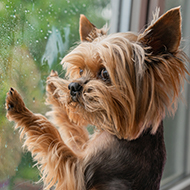One in 10 'pandemic puppy' owners worried about life after lockdown

More than a fifth of new owners are worried about behavioural problems resulting from a lack of socialisation.
New figures have revealed that around one in 10 per cent of owners who bought a dog during the coronavirus pandemic are now worried about not being able to care for them when the lockdown restrictions end.
Kennel Club data shows that more than a fifth of new owners are worried about behavioural problems resulting from a lack of socialisation. One in three owners had not made a plan for their pet when life returns to normal.
It also suggests that a quarter of new owners are worried about the problematic behaviours their dog might have developed during the lockdowns such as aggression, shyness and separation anxiety. Nearly a fifth expressed concern that their dog will not fit into their lifestyle when they return to work.
The troubling findings have prompted the Kennel Club to develop a range of online resources offering training, health and behavioural advice as part of its Be Puppywise campaign.
Kennel Club spokesperson, Bill Lambert, said: “Training and socialisation are an essential part of a dog’s life from their puppyhood all the way through to their older years. Training doesn’t only ensure that a dog, owner as well as other dogs and humans are safe, it also strengthens the bond between dog and owner significantly.
“We would urge any owners who are worried about their dog’s behaviour, health or socialisation to make use of all of our Be Puppywise resources, including contacting a dog trainer or behaviourist if you’re struggling, to ensure you and your four-legged friend are ready to return to normal life together once restrictions are lifted. Dog ownership is a lifelong commitment and it’s your responsibility to give them the best foundation for a happy, healthy and confident life.”
More than 2,600 dog owners responded to the Kennel Club survey on 'Pandemic Puppies' carried out in July 2020.
More than a third of respondents said their main motivation for getting their dog was because they were spending more time at home. One in five admitted they hadn’t fully considered the long-term commitment or responsibility that comes with having a dog.
The data also highlights concerns about lockdown behaviour on the physical health of puppies. A fifth of dog owners said they were concerned about their dog’s weight due to overfeeding them during lockdown.



 The Veterinary Medicines Directorate (VMD) is inviting applications from veterinary students to attend a one-week extramural studies (EMS) placement in July 2026.
The Veterinary Medicines Directorate (VMD) is inviting applications from veterinary students to attend a one-week extramural studies (EMS) placement in July 2026.